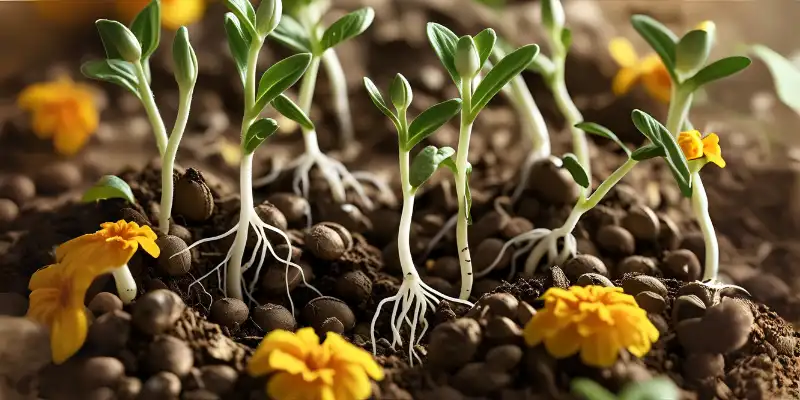How to Master Marigold Seed Germination: A Beginner’s Guide
Published: 11 Jul 2025
Hello, nature explorer!
Do you wonder how long it takes for marigold seeds to wake up and start growing? In the right conditions, marigold seed germination can begin in just 4 to 7 days, which is quicker than a school week. These cheerful flowers sprout fast and brighten any garden. Whether you’re growing indoors or directly in soil, understanding marigold seed germination is the first step to success.

I’m Sheila, a botanist with seven years of hands-on experience in seed science. In this guide, I’ll walk you through the germination timing, steps, common mistakes, care tips, and fun facts, all in simple, beginner-friendly steps.
By the end, you’ll confidently know when and how to germinate marigold seeds like a pro. Let’s turn those tiny seeds into golden blooms; your flower journey starts here!
Marigold Seed Germination: Everything You Need to Know
Starting marigolds from seed is like planting sunshine in your garden: fast, simple, and rewarding. But for the magic to begin, it all comes down to one thing: germination. Let’s break down exactly what happens beneath the soil and how you can support your seeds every step of the way.
How Long Does It Take for Marigold Seeds to Germinate?
- Most marigold seeds germinate within 4 to 7 days when provided with the right warmth and moisture.
- If your space is cooler, expect it to take up to 10–14 days, especially outdoors or in early spring.
- Indoor setups with steady warmth and humidity often produce faster growth.
- Pro Tip: I once used a seed tray on top of my refrigerator for extra warmth and saw sprouts in just 3 days!
Conditions for Successful Marigold Germination
Marigold seeds may be small, but they’re particular about their environment. Just like baking a cake, the right ingredients and temperature make all the difference. To ensure healthy, fast sprouts, pay close attention to soil warmth, texture, light, and moisture.
Ideal Temperature, Soil, and Light
- Keep the soil temperature between 21–24°C (70–75°F); this is the ideal range for marigold seeds to flourish.
- Light isn’t essential during germination, but warmth is. Once seedlings emerge, move them to a sunny spot.
- Choose a lightweight, well-draining seed-starting mix with a neutral to slightly acidic pH (6.0–7.0).
- In my early gardening days, I used garden soil. I packed the soil too much, which slowed germination. A fluffy mix changed everything!
Moisture and Watering Tips
- Keep the soil evenly moist, like a wrung-out sponge, not soaking wet.
- Mist with a spray bottle to avoid disturbing seeds. Gentle watering ensures they stay in place and don’t rot.
- Wrap the tray with a humidity dome or clear plastic wrap to lock in warmth and moisture, creating a mini greenhouse effect on your windowsill.
How to Start Marigold Seeds Indoors
Starting marigold seeds indoors is like giving your flowers a head start on the race to bloom. It’s easy, mess-free, and ideal for controlling the environment, especially in colder regions or unpredictable weather conditions. With the proper setup, you’ll see sprouts in just a few days.
To plant a garden is to believe in tomorrow.Audrey Hepburn
Step-by-Step Indoor Germination Method
- Fill seed containers or small pots with a moist, well-draining seed-starting mix.
- Plant marigold seeds about ¼ inch deep, shallow enough for quick sprouting.
- Gently press the soil to settle the seeds, but don’t compact it.
- Mist lightly using a spray bottle to keep the top layer evenly moist.
- Enclosed with a humidity dome or clear plastic wrap to hold warmth and moisture.
- Place the setup in a warm, well-lit spot with indirect light; avoid direct sunlight at this stage.
- Watch for sprouts in 4–7 days, depending on room temperature.
Personal Tip: I place my trays on top of the fridge; the gentle heat speeds up sprouting without the need for a heat mat.
When to Start Marigold Seeds Indoors
- Begin sowing marigold seeds 6 to 8 weeks before the last expected frost in your area.
- Use a regional seed-starting calendar or consult your local nursery for the best timing.
- Getting the timing right ensures your seedlings are vigorous and transplant-ready just as spring warms up.
Direct Sowing: Germinating Marigold Seeds Outdoors
If indoor sowing feels like prepping in a kitchen, then direct sowing marigolds outdoors is like baking straight in the garden oven, simple, earthy, and satisfying. Once the cold weather fades, your flower beds become the perfect place for seeds to sprout naturally under the sun.
- Please wait until the weather is no longer cold and the soil feels a little warm when you touch it. Cold soil makes it difficult for seeds to germinate and grow.
- Loosen the soil gently and moisten it before sowing. A soft bed helps roots push through, just as we need comfortable shoes for a long walk.
- Leave some space between each seed, about 6 to 12 inches, so the plants have plenty of room to grow big and healthy.”
- Plant shallowly, about ¼ inch deep, and cover lightly with soil.
- Water the area gently but thoroughly, and keep it moist until small green shoots appear.
In my garden, I’ve found that French marigolds germinate more reliably outdoors than the taller African types, especially when sowed after a warm spring rain.
Common Marigold Germination Mistakes to Avoid
Although marigolds are beginner-friendly, a few minor mistakes can delay or even prevent germination altogether. Think of your seeds like tiny babies; they need the right warmth, space, and gentle care to grow well.
Let’s look at some common slip-ups and how to avoid them.👇
|
After Germination: What to Do Next
Once your marigold seeds have sprouted, the real fun begins; it’s like watching toddlers take their first steps. These young seedlings now require space, light, and care to grow strong before they are planted outdoors.
- Move the seedlings to a sunny windowsill or place them under grow lights for at least 6 hours a day. Light helps them grow tall and sturdy, not leggy or weak.
- Thin out the extra seedlings by gently snipping the smaller ones. This gives the stronger plants room to grow, like choosing the best runners in a race.
- When the first true leaves appear (not the baby seed leaves), transplant them into bigger pots or garden beds.
- Harden them off before planting them outside permanently — slowly expose them to outdoor light and air for a few hours each day over a period of a week.
Personal Experience: One time, I didn’t let my marigold plants adjust to the outside weather gradually, and they drooped in the sun. Now, I always give them time to adjust. It helps them grow strong.
Benefits of Growing Marigolds from Seed
Growing marigolds from seed is like baking your favorite cookies from scratch. It’s budget-friendly and fun, and you enjoy every step of the process.
The love of gardening is a seed once sown that never dies.Gertrude Jekyll
Whether you’re a beginner or a young gardener working on a school project, marigolds offer fast results and lasting joy.
- Marigold seeds are inexpensive and readily available, making them an excellent choice for both young and experienced gardeners.
- They sprout quickly, often in less than a week, which makes them exciting to grow, especially for kids and beginners.
- Marigolds attract bees and butterflies while repelling harmful bugs, making them valuable companions in vegetable gardens.
- They grow well in borders, pots, or small school gardens, adding bright colors and learning opportunities wherever you plant them.
From my experience, marigolds are one of the best starter plants; their cheerful blooms always bring smiles and a sense of success, even to first-time growers.
| Trivia Time! Fun Facts About Marigolds |
|---|
|
Conclusion
Watching marigold seed germination is a beautiful reminder that even the smallest beginnings can bloom into something bright and full of life. Whether you’re planting in a garden bed, schoolyard, or a little pot by the window, each seed holds the promise of cheerful blooms.
From my experience, patience, warmth, and gentle care are all you need to help your marigolds thrive. So, grab your seeds and start today — it’s easier than you think!
Ready to turn tiny seeds into sunny blooms? Let’s get growing!
Frequently Asked Questions
Still, have questions about growing marigolds from seed? Don’t worry. Many beginners wonder the same things. Let’s address some of the most frequently asked questions readers have about planting with confidence.
Marigold seeds typically germinate within 4 to 7 days when the soil is warm. Cooler temperatures may slow them down, taking 14 days. Be patient, once they sprout, they grow quickly!
No, marigold seeds do not need light to start germinating. They prefer warm, dark soil to begin the process. Once they sprout, they require sunlight or grow lights to remain healthy.
Soaking marigold seeds is optional not required. Some gardeners soak them for 8–12 hours to speed up the sprouting process, but they grow just fine when planted dry. If you’re short on time, you can skip it.
You can start marigolds indoors, but they grow best with lots of sunlight. Without enough light, they may get tall and weak. Use a sunny window or a grow light for vigorous plants if you plan to grow year-round.
Start seeds indoors 6–8 weeks before the last frost or directly in the garden after the frost has ended. Marigolds thrive in warm soil, so wait until the weather feels like spring outside. Cold weather slows down germination.
Plant marigold seeds about ¼ inch deep in the soil. That’s just enough to cover them lightly and keep them moist. Planting too deep can stop them from sprouting.
Yes, marigolds are great for kids and beginners! They grow quickly, require minimal care, and show results in just a few days. They’re also perfect for school science projects and learning about plant life.
Most marigolds are annuals, meaning they grow for one season and then die. However, you can collect seeds from the dried flowers and replant them next year. Some gardeners do this to encourage their favorite blooms to come back.
Space marigold seeds 6 to 12 inches apart, depending on the variety. Give them room to grow, just those chairs around a table. Crowded seedlings may compete for light and water.

- Be Respectful
- Stay Relevant
- Stay Positive
- True Feedback
- Encourage Discussion
- Avoid Spamming
- No Fake News
- Don't Copy-Paste
- No Personal Attacks

- Be Respectful
- Stay Relevant
- Stay Positive
- True Feedback
- Encourage Discussion
- Avoid Spamming
- No Fake News
- Don't Copy-Paste
- No Personal Attacks





